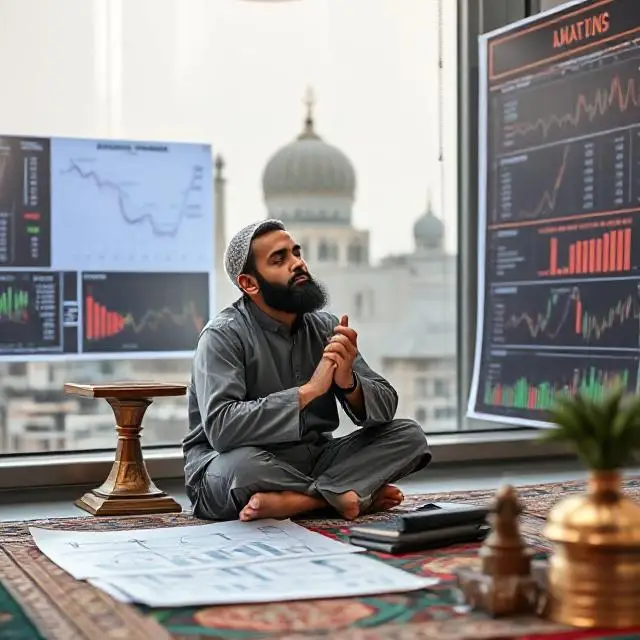The Power of Shukr (Thankfulness) in Trading: Accepting Every Result as a Blessing

فَٱذْكُرُونِىٓ أَذْكُرْكُمْ وَٱشْكُرُوا۟ لِى وَلَا تَكْفُرُونِ ١٥٢
remember Me; I will remember you. And thank Me, and never be ungrateful.
The Power of Shukr (Thankfulness) in trading : Accepting Every result as a blessing
Trading is often seen as a game of numbers, probabilities, and technical analysis, but for a Muslim trader, it is much more than that. As Muslims, we believe that everything happens by the will of Allah (SWT), and every trade—whether profitable or not—is part of a greater plan.
Shukr (thankfulness) plays a crucial role in shaping our trading mindset. When we express gratitude, regardless of the outcome, we align ourselves with a positive and resilient psychology that ultimately leads to long-term success.
This blog explores how the concept of Shukr can transform the way we approach trading, from managing emotions to making better trading decisions. We will also discuss how Alhamdulillah (praising Allah in all situations) helps traders maintain a balanced and disciplined mindset.
Shukr in Islam: A Life-Changing Paradigm Shift
Allah (SWT) tells us in the Quran:
“If you are grateful, I will surely increase your favor; but if you deny, indeed, My punishment is severe.” (Surah Ibrahim 14:7)
Shukr is not just about being thankful when we win; it is about being grateful even when we experience losses. This mindset shift can completely transform a trader’s psychology. Rather than being frustrated over a losing trade, a trader who practices Shukr acknowledges that everything happens for a reason and trusts in Allah’s divine wisdom.
In trading, losses are inevitable. However, when we respond to them with gratitude, we remove emotional baggage that could lead to revenge trading or impulsive decisions. Instead, we focus on learning from our mistakes, improving our strategy, and accepting that success and failure are both tests from Allah.
The Psychological Benefits of Shukr in Trading
Many traders struggle with emotions such as fear, greed, and frustration. By practicing Shukr, we gain psychological strength that helps us:
1. Develop Patience (Sabr) in Trading
Patience is a key virtue in Islam and an essential trait for successful trading. When a trade doesn’t go our way, instead of reacting impulsively, we should say, Alhamdulillah, knowing that Allah (SWT) has a better plan for us. This patience prevents us from making rushed decisions and helps us trade with discipline.
2. Reduce Stress and Anxiety
A trader who believes that all results are from Allah (SWT) does not experience unnecessary stress over losses. By practicing gratitude, we eliminate unnecessary worry about things beyond our control. Shukr helps us focus on the process rather than obsessing over the outcome.
3. Enhance Self-Control and Discipline
When a trader is grateful, they develop a stronger sense of self-control. Greed and desperation diminish because we trust that our provision (rizq) is already written by Allah (SWT). Instead of forcing trades, we patiently wait for high-quality setups, leading to more consistent profits.
Practical Ways to Implement Shukr in Trading
Now that we understand the importance of Shukr, how can we apply it in our daily trading routine?
1. Say Alhamdulillah After Every Trade
Regardless of whether the trade was a win or a loss, always say Alhamdulillah. This small habit reminds us that everything is from Allah and that every experience has a purpose.
2. Keep a Gratitude Journal
Write down three things you are grateful for every day. This could include:
The ability to trade and invest
The knowledge you have gained from a losing trade
The discipline to stick to your trading plan
Focusing on gratitude keeps you in a positive mental state, reducing frustration and increasing contentment.
3. Make Dua for Guidance and Success
Before entering the markets each day, make dua for Allah’s guidance. Ask Him to grant you success in your trades and the ability to accept losses with patience. This keeps your heart connected to Allah and reminds you that trading is not just about skill but also divine decree.
4. Give Sadaqah (Charity) From Your Profits
One of the best ways to show gratitude is by giving back. If Allah blesses you with profits, take a portion and give it to those in need. Not only does this bring barakah (blessings) into your earnings, but it also helps you detach from greed and materialism.
5. Remind Yourself That Rizq (Sustenance) Is From Allah
Your profits and losses do not define your worth. Your sustenance is already decreed by Allah, and no amount of stress will change that. When you internalize this belief, you will trade with a calmer and more patient heart.
Shukr and Risk Management: A Powerful Combination
Shukr doesn’t mean blindly accepting losses without analysis. Instead, it enhances our ability to implement good risk management practices. A grateful trader does not gamble recklessly because they respect the wealth Allah has entrusted them with. They follow these principles:
Stick to a Stop Loss: Rather than hoping for a trade to recover, accept the loss and say Alhamdulillah.
Take Profits When the Market Offers Them: Greed makes traders overstay their positions, but gratitude reminds them to appreciate the profits they’ve already made.
Trade with a Clear Plan: Instead of chasing the market, grateful traders patiently wait for high-quality setups.
Lessons from the Lives of Prophets and Successful Traders
Prophet Ayub (AS): A Model of Patience and Gratitude
Prophet Ayub (AS) faced immense hardships, yet he never wavered in his gratitude to Allah. His story reminds us that trials are a test of faith, and perseverance leads to ultimate success. In trading, just as in life, patience and gratitude go hand in hand.
The Mindset of Professional Traders
Professional traders understand that losses are part of the game. They do not let emotions dictate their decisions. Similarly, as Muslims, we should not allow the ups and downs of the market to shake our faith in Allah’s plan.
Conclusion: Trading With an Attitude of Gratitude
A trader who embraces Shukr is not easily shaken by the markets. Whether a trade ends in profit or loss, they remain calm, knowing that every outcome is decreed by Allah (SWT).
By practicing gratitude, we shift our focus from fear and greed to patience and discipline. We remind ourselves that true success is not just financial gain but spiritual growth. Trading with Shukr not only improves our results but also strengthens our relationship with Allah (SWT).
So the next time you trade, say Alhamdulillah for the opportunities, the lessons, and the rizq Allah has written for you.
May Allah grant us success in both this life and the next, and may our trading journey be filled with barakah and gratitude. Ameen!

